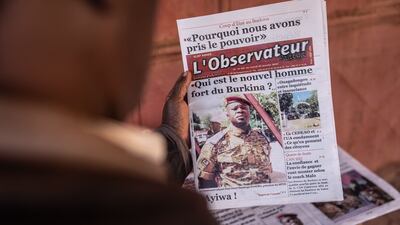A new junta came into power on Tuesday in Burkina Faso after soldiers ousted the democratically elected President Roch Marc Christian Kabore.
On Monday evening, dozens of soldiers declared on state media that a new organisation calling itself “the Patriotic Movement for Safeguarding and Restoration" had seized control of the country.
The announcement ended days of gunfire in the capital of Ouagadougou.
“Today’s events mark a new era for Burkina Faso. They are an opportunity for all the people of Burkina Faso to heal their wounds, to rebuild their cohesion and to celebrate what has always made us who we are: integrity,” said Capt Sisdore Kaber Ouedraogo.
Many residents of the capital appeared pleased by the coup and celebrations were planned for Tuesday, but regional African leaders and international bodies have condemned the military takeover.
The junta closed the borders, imposed a curfew, suspended the constitution and dissolved the government and parliament and said it would return Burkina Faso to constitutional order.
The soldiers said the overthrown president is safe, but did not reveal where he is being held. A publicly circulated resignation letter signed by Mr Kabore said he was quitting his office in the best interest of the country.
The coup comes after months of growing frustration at the government's inability to stem an insurgency in which thousands have died and about 1.5 million have been displaced.
The ill-equipped military has struggled to battle fighters linked to ISIS and Al Qaeda.
“A simple change in leadership is unlikely to turn the tide,” said Constantin Gouvy, a Burkina Faso researcher who works for the Clingendael Institute, a think tank in the Netherlands.
“What we do know though is that some of the mutineers’ demands include better material and reinforcements, better training and better handling of the wounded and families of fallen soldiers. Essentially, they are asking for a better hierarchy that listens to their concerns,” he said.
The new leaders appear to be young and are said to be within the higher ranks of the lower tier of officers.
Lt Col Paul Henri Sandaogo Damiba, believed to be the leader, is a published author in his early forties and was recently promoted by Kabore.

One mutinous soldier told The Associated Press that younger officers who had experienced war needed to run the country, rather than older ones who had never used their guns outside of military training.
He said the younger men might not have governance experience but they could learn. The junta is now meeting with religious and community leaders as well as the previous government to discuss a way forward, he said.
To some in Burkina Faso, the soldiers’ youth is one of the reasons they believe they’ll be able to succeed.
“If you look at those who have taken power they seem to be younger and we hope they will bring younger ideas, bring better ideas than we have seen up until now,” Aliou Ouedraogo, who lives in Ouagadougou, said.
The international community has condemned the takeover.
The West African regional bloc known as Ecowas said the soldiers should return to their barracks and called for dialogue with the authorities.
UN Secretary General Antonio Guterres told the coup leaders to lay down their arms, while France condemned the coup and called for the immediate release of the president.

A western diplomat in Ouagadougou said the military takeover would have serious implications for Burkina Faso’s relationships with international partners and could negatively impact the country’s security and development, including receiving international aid.
The US State Department said it was deeply concerned by events in Burkina Faso, calling for restraint by all actors. It said it would review the events on the ground for any potential impact on assistance.
“We condemn these acts and call on those responsible to deescalate the situation, prevent harm to President Kabore and any other members of his government in detention, and return to civilian-led government and constitutional order,” department spokesman Ned Price said in a statement on Monday.
“We acknowledge the tremendous stress on Burkinabe society and security forces posed by ISIS and JNIM but urge military officers to step back, return to their barracks, and address their concerns through dialogue.”

